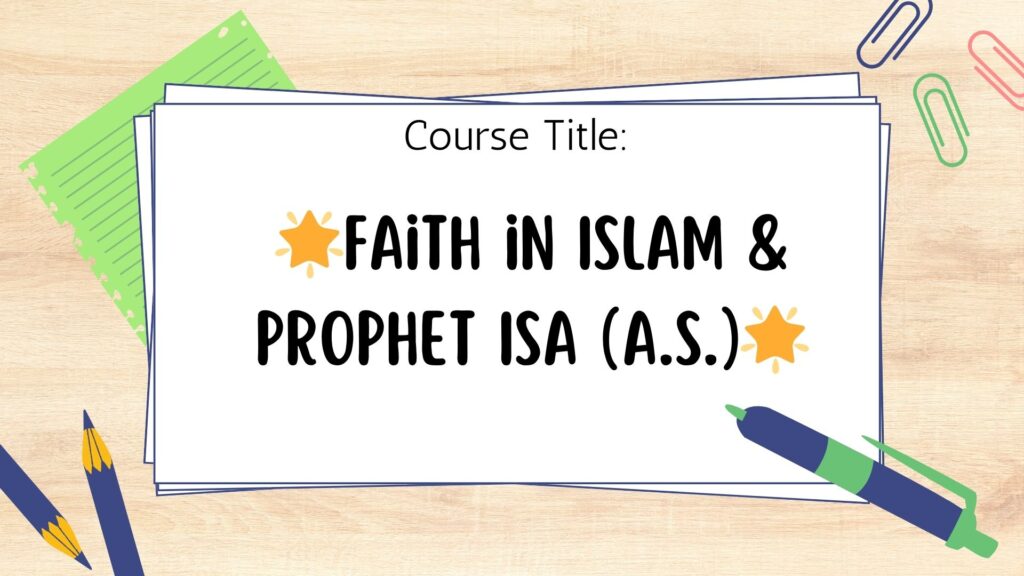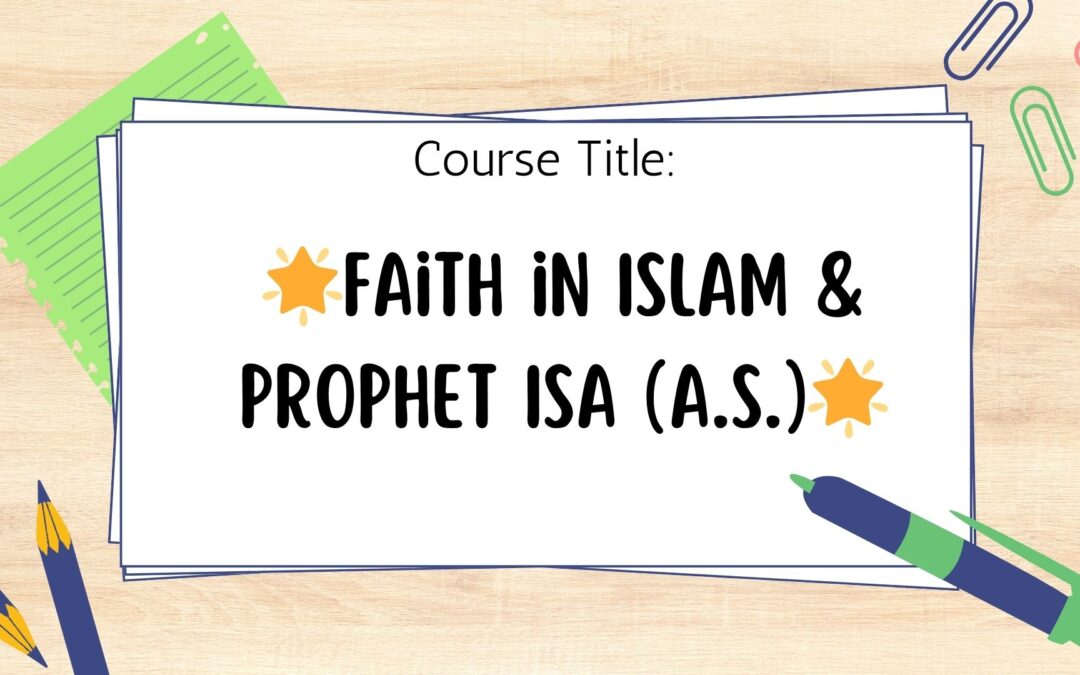Faith in Islam & Prophet Isa A.S in islam

Table of Contents
Day 1: Faith in Prophets and the Story of Prophet Isa (A.S.)
Objective: To introduce children to the significance of faith in the Prophets and the story of Prophet Isa (A.S.) in Islam.
What Does Faith in Prophets Mean?
Believing in the Prophets is an essential part of a Muslim’s faith. Allah chose prophets to guide humanity, and Muslims believe in all the Prophets, including Prophet Isa (A.S.), as messengers of Allah.
Reference:
- Quran 2:136: “We believe in Allah and in what was revealed to us, and in what was revealed to Ibrahim, Isma'il, Ishaq, Ya'qub, and the descendants, and in what was given to Musa and Isa, and in what was given to the prophets from their Lord.”
Story of Prophet Isa (A.S.)
Prophet Isa (A.S.) was born miraculously to Maryam (A.S.), without a father, by the command of Allah. This was one of the signs of Allah’s power. Prophet Isa (A.S.) performed miracles like speaking from the cradle, healing the sick, and bringing the dead to life, all by Allah’s permission. However, over time, some people started to believe in him as the son of Allah, which is a misunderstanding in Islam.
Reference:
- Quran 3:45-47: Allah’s announcement to Maryam (A.S.) about the birth of Isa (A.S.) and the miraculous nature of his birth.
Discussion Points:
- Why do Muslims believe in Prophet Isa (A.S.) as a Prophet, not as the son of Allah?
- What do Prophet Isa's (A.S.) miracles tell us about Allah’s power?
Activity:
Children will write a summary of what they understand about Prophet Isa (A.S.) and discuss how they can explain his story to others.
Day 2: The Story of Ashab-e-Kahf and Surah Al-Kafiroon
Objective: To teach children the importance of staying firm in their beliefs through the story of Ashab-e-Kahf and Surah Al-Kafiroon.
The Story of Ashab-e-Kahf
Ashab-e-Kahf (the People of the Cave) were young men who refused to follow their people's idolatry. They fled to a cave to preserve their faith, and Allah caused them to sleep for 300 years, protecting them from the corrupt society around them.
Reference:
- Quran 18:9-26: The story of Ashab-e-Kahf and how Allah preserved and protected their faith.
Surah Al-Kafiroon
Surah Al-Kafiroon teaches Muslims to stay true to their faith while respecting the beliefs of others. It declares that Muslims do not worship what others worship and emphasizes the clear distinction between Islam and disbelief.
Reference:
- Quran 109:1-6: “Say, ‘O disbelievers, I do not worship what you worship… For you is your religion, and for me is my religion.’”
Discussion Points:
- How did Ashab-e-Kahf stay firm in their faith despite pressure from their society?
- How can we use Surah Al-Kafiroon to politely say "No" to celebrations that are not part of our religion?
Activity:
Children will practice reciting Surah Al-Kafiroon and discuss how they can apply it when they need to decline non-Islamic celebrations, such as Christmas.
Day 3: The Miracles of Prophet Isa (A.S.), the Creation of Adam (A.S.), and Other Prophets
Objective: To explain the miracles of Prophet Isa (A.S.), the creation of Prophet Adam (A.S.), and other examples of miracles given to Prophets in Islam.
The Miracles of Prophet Isa (A.S.)
Prophet Isa (A.S.) performed several miracles by the will of Allah, including:
- Speaking as a baby from the cradle.
- Healing the blind and the leper.
- Bringing the dead back to life.
These miracles were signs from Allah to guide the people, but some misunderstood them and began to believe that Isa (A.S.) was divine, which is contrary to Islamic teachings.
Reference:
- Quran 3:49: “I cure the blind and the leper, and I give life to the dead - by permission of Allah.”
The Creation of Prophet Adam (A.S.)
Prophet Adam (A.S.) was created by Allah from clay, without a father or mother. His creation is often referenced in relation to the miraculous birth of Prophet Isa (A.S.), as both were created by Allah’s will in unique ways.
Reference:
- Quran 3:59: “Indeed, the example of Jesus to Allah is like that of Adam. He created him from dust; then He said to him, ‘Be,’ and he was.”
Other Prophets and Their Miracles
- Prophet Musa (A.S.): Parted the Red Sea and performed many other miracles, such as turning his staff into a snake.
- Prophet Ibrahim (A.S.): Was saved by Allah when his people tried to burn him in the fire.
- Prophet Muhammad (S.A.W.): The splitting of the moon and the miraculous night journey (Isra and Mi'raj).
These miracles were given to the Prophets as a means to show Allah’s power and guide people to the truth, not as proof of the Prophets' divinity.
Discussion Points:
- How does the creation of Adam (A.S.) relate to the miraculous birth of Isa (A.S.)?
- Why does Allah give miracles to Prophets?
Activity:
Children will create a visual representation (drawing or short writing) of one of the miracles they learned about and explain its significance.
Conclusion:
At the end of this 3-day course, children will have gained a deeper understanding of:
- Faith in Prophets and the significance of Prophet Isa (A.S.) in Islam.
- Why Muslims do not celebrate Christmas and how to stay firm in their beliefs through Surah Al-Kafiroon.
- The role of miracles in Islam, the creation of Adam (A.S.), and examples from other Prophets help children strengthen their connection to their faith and confidently navigate diverse societies.
How do I enroll in this course?
Click here

